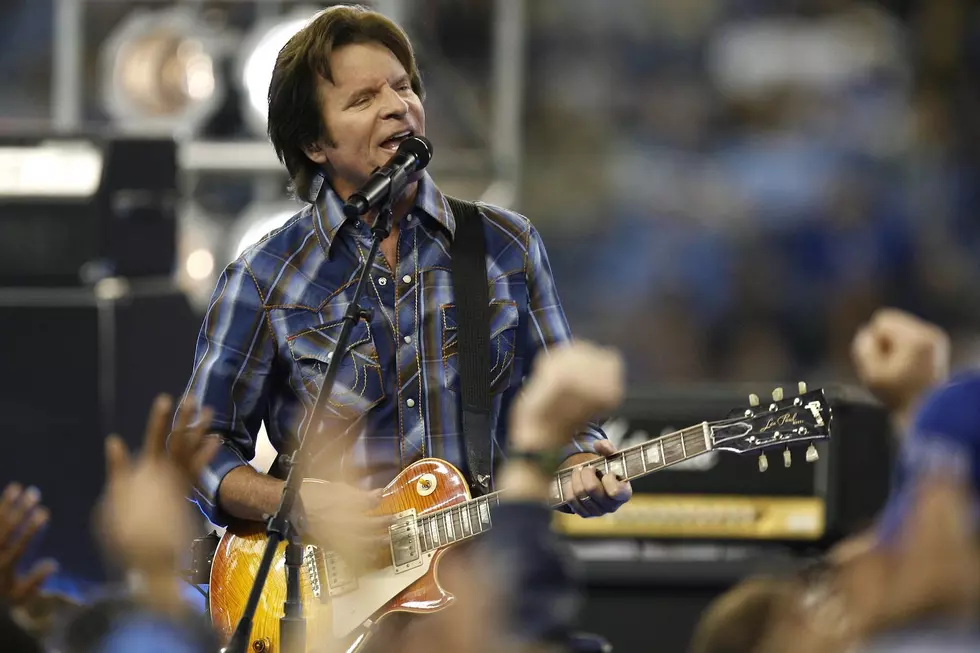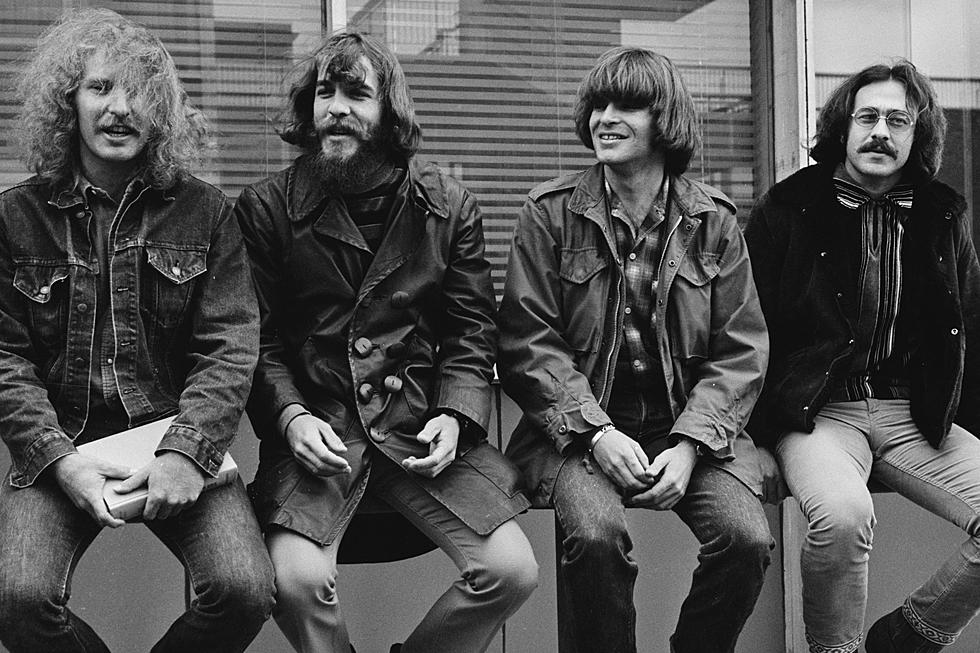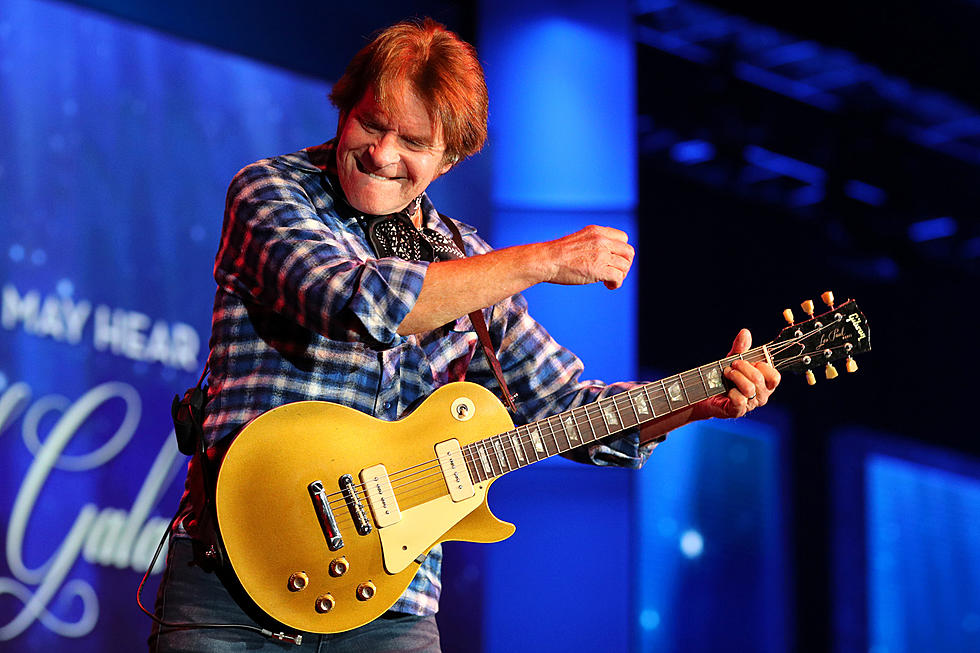
Top 10 John Fogerty Lyrics
In Creedence Clearwater Revival and his solo career, John Fogerty has found a way to blend age-old wisdom with current event commentary – something worth celebrating in this list of the Top 10 John Fogerty Lyrics. Bruce Springsteen once called Fogerty the Hank Williams of his generation, likely because the Creedence frontman – just like old Hank – can tap into the bloodline of America. He tells stories from our past, confronts us with truths from our present and ponders what it all means for our future. Sometimes it’s tough to convey Fogerty’s brilliance as a lyricist, just because his language is so direct and simple, never overly adorned. When he does turn a phrase, it makes his clever streak that more noticeable. With that in mind, here are some of his best lines.
- 10
‘Rock and Roll Girls’
John FogertyFrom: ‘Centerfield’ (1985)
“But there is a place, sweet as you will ever know / In music and love, and things you never tell / You see it in their face, secrets on the telephone / A time out of time, for you and no one else”
In the ’80s, there seemed to be a rash of songs about the glory of rock and roll – featuring platitudes about life and how a rock record could make it just a little better. That’s where this hit, from Fogerty’s blockbuster comeback album, appears to be headed before the singer howls the lyrics above. They speak to the mystery of pop music – how it can become a secret handshake between friends, the soundtrack to a memory that means everything. The more you try to explain it, the less it makes sense, because all that matters is that feeling.
- 9
‘Wrote a Song for Everyone’
Creedence Clearwater RevivalFrom: ‘Green River’ (1969)
“Wrote a song for everyone / When I couldn’t even talk to you”
This country ballad moseys along, referencing modern times, Civil War struggles and slavery through the ages, but its prime concern seems to be about being understood. The refrain certainly suggests that Fogerty was contrasting his ability to express his feelings in music beloved by millions with his inability to share his thoughts with someone intimately connected to his life. Of course, you may have a completely different interpretation, which speaks to the glorious ambiguity of this line.
- 8
‘Run Through the Jungle’
Creedence Clearwater RevivalFrom: ‘Cosmo’s Factory’ (1970)
“Thought I heard a rumblin’, callin’ to my name / Two hundred million guns are loaded, Satan cries, ‘Take aim’ / Better run through the jungle”
Many have associated this song, which includes the eighth entry on the Top 10 John Fogerty Lyrics, with the Vietnam War. Given the time it was released and Fogerty’s other songs about the conflict, this is understandable. However, the songwriter was actually inspired by America’s gun culture at home. Fogerty has written many songs cloaked in ominous foreboding (‘Bad Moon Rising,’ ‘Premonition’ and ‘The Old Man Down the Road,’ which has its own special, litigious tie to ‘Run Through the Jungle’). But the danger in the song feels just a little more imminent, especially when you’ve got Satan on your tail.
- 7
‘I Saw it on T.V.’
John FogertyFrom: ‘Centerfield’ (1985)
“The old man rocks among his dreams / A prisoner of the porch / ‘The light,’ he says, ‘at the end of the tunnel / Was nothin’ but a burglar’s torch.’"
Here’s another song in which Fogerty upsets our expectations. What begins as a nostalgia fest for boomers (Howdy Doody! JFK! The Beatles!) takes a frightening turn in its final verse. We find out we’ve been sitting with a sad and lonely man, who’s been ruminating on the big events in his lifetime. His memories end in tears when he recalls how his son was taken away from him when he died in the Vietnam War. The cruel twist from Fogerty is that he uses some of his most poetic language to describe the man’s complete and utter absence of hope.
- 6
‘Bootleg’
Creedence Clearwater RevivalFrom: ‘Bayou Country’ (1969)
“Take you a glass of water / Make it against the law / See how good the water tastes / When you can’t have any at all”
Fogerty didn’t write songs for CCR; he wrote parables. ‘Bootleg’ is a perfect example of his employment of folk wisdom. Over the shuffling tune, he describes three instances (ranging from prohibition to “cherry pie”) in which he demonstrates the eternal human truth: you always want what you cannot have. Is that a 20-something California kid singing, or is it a high llama from the bayou?
- 5
‘Proud Mary’
Creedence Clearwater RevivalFrom: ‘Bayou Country’ (1969)
“Left a good job in the city / Workin’ for the man every night and day / And I never lost one minute of sleepin’ / Worryin’ ’bout the way things might have been”
The epitome of Fogerty’s Southern myths is this Mississippi River fable, which was inspired by the musician’s discharge from the army. His own memories and his impressions of the South and his imagination were all blended together to become ‘Proud Mary.’ In the opening lines of this classic, the language is just perfect – this is the cadence of how people talk. The lack of ornamentation and the direct nature of the feelings make it incredibly poetic.
- 4
‘Someday Never Comes’
Creedence Clearwater RevivalFrom: ‘Mardi Gras’ (1972)
“And daddy always smiled; took me by the hand, sayin’, ‘Someday you’ll understand’ / Well, I'm here to tell you now each and every mother’s son / You better learn it fast; you better learn it young, ’cause someday never comes”
There’s not a whole lot worth salvaging from CCR’s unfortunate swan song – except for this song. ‘Someday Never Comes’ is both heartfelt and tragic, as Fogerty describes his parents’ divorce and its effects on him. Then, he brings it full-circle by chronicling his own absence in his young son’s life. There’s no happy ending, just the lesson that in this life, you can’t wait around hoping that wisdom will find you.
- 3
‘Effigy’
Creedence Clearwater RevivalFrom: ‘Willy and the Poor Boys’ (1969)
“Last night I saw the fire spreading to the palace door / Silent majority weren’t keeping quiet anymore / Who is burnin’? Who is burnin’? Effigy”
This twangy epic turns late ’60s politics into an incendiary display of disapproval. Or, perhaps ‘Effigy’ is about a zombie apocalypse. The phrase “silent majority” often meant those who had died, although President Nixon changed the popular meaning when he spoke about the “silent majority” of Americans who supported him (in contrast to the vocal minority of anti-war demonstrators). In this entry into the Top 10 John Fogerty Lyrics, the songwriter seems to spell doom, and not just for those in the palaces. Is it a parable of distrust, or warning against a zombie attack? You be the judge.
- 2
‘Who’ll Stop the Rain’
Creedence Clearwater RevivalFrom: ‘Cosmo’s Factory’ (1970)
“Long as I remember, the rain been comin’ down / Clouds of mystery pourin’ confusion on the ground / Good men through the ages trying to find the sun / And I wonder, still I wonder, who’ll stop the rain?”
In the early ’70s, Fogerty and CCR had a pair of hits with rain songs. The other one (‘Have You Ever Seen the Rain?’) was about his band. This one had a larger scope, with Fogerty getting philosophical about the world’s problems. It appears that he feels the efforts to solve widespread maladies are futile, whether it’s the intelligentsia, politicians or the Woodstock generation who are doing the fixing. It’s Fogerty’s most cleverly written allegory.
- 1
‘Fortunate Son’
Creedence Clearwater RevivalFrom: ‘Willy and the Poor Boys’ (1969)
“Some folks inherit star-spangled eyes /Ooh, they send you down to war/ And when you ask them, ‘How much should we give?’ /Ooh, they only answer, ‘More! More! More!’”
While other songwriters were set on describing war’s general badness, Fogerty got specific. For this legendary protest anthem, he stuck up for all the folks down on the corner or hanging out on Green River or stuck in Lodi. Fogerty zeroed in on the rich and powerful who send poor kids off to fight but find ways for their children to avoid seeing action. This greed and dishonesty angered him, which is palpable in the way he roars his way through the tune. It’s not just Fogerty’s emotion, but the words that make this song great. “Star-spangled eyes” is one of the best descriptive phrases in all of rock and roll, a uniquely American twist on rose-colored glasses.
More From Ultimate Classic Rock









